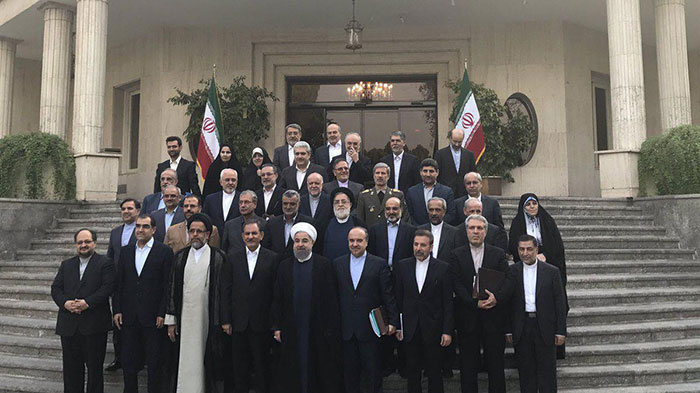Facts and Figures about Hassan Rouhani’s Second Cabinet and the Parliament’s Vote of Confidence
Here are 10 facts about the recent parliamentary vote of confidence on President Rouhani’s proposed ministers.

Hassan Rouhani’s second cabinet was introduced to the parliament for a vote of confidence this week. On Sunday, the 18-member list was put to vote in Majles, and except for one candidate, all members received affirmative votes from the legislative. Fararu, moderate website, has offered some insight on facts and figures of the Sunday vote, and its implications. The analysis is as follows:
- The number of affirmative votes given to individual ministers could account for the fact that the lawmakers have gone for President Rouhani. Twelve of the 17 proposed ministers won more than 200 hundred votes, a sign for full-fledged support from the parliament.
- The four ministers with the highest number of votes are Defense Minister Amir Hatami (261 votes), Healthcare Minister Hassan Ghazizadeh Hashemi (253 votes) , Intelligence Minister Mahmoud Vaezi (252 votes) and Interior Minister Abdolreza Rahmani Fazli (250 votes). This indicates the lawmakers’ satisfaction with ministers proposed for security and political spheres.
- The four ministers with the lowest number of votes are Telecommunications Minister Mohammad-Javad Azari Jahromi (152 votes), Agriculture Minister Mahmoud Hojjati (164 votes), Roads and Urban Development Minister Abbas Ahmad Akhoundi (188 votes), and Labor Minister Ali Rabiei (191 votes).
- The proposed energy minister Habibollah Bitaraf obtained 133 affirmative votes, failing to secure a vote of confidence. The Reformist figure was refused confidence apparently because of his long history in damming and water transfer. Parliamentarians say the naysayers had no political intensions. An interesting fact is that 142 lawmakers had registered to speak in favor of Bitaraf the day before the votes were cast. Remember! He only won 133 votes. In fact, nine of his advocates did not vote for him!
- The parliament’s vote for two generals of the eleventh administration indicates the lawmakers’ satisfaction with their record in the past four years. Javad Zarif won 236 affirmative votes with only 26 negatives and Bijan Zanganeh gained 230 votes, against 35 nos. This suggests unanimous support for the two controversial ministers. However, the other general Abbas Akhoundi failed to obtain more than 188 votes. Seventy-five lawmakers voted against him. The opposition seems to be about the Mehr Housing Plan.
- A shocking episode was the vote of confidence given to Education Minister Mohammad Bathaei, despite widespread debate outside the parliament and in cultural circles, criticizing him for his past records and future plans. He secured 238 votes vis-à-vis only 35 negatives votes.
- Another interesting fact is the higher votes of endorsement in this term shows that the Rouhani administration is better approved than the Ahmadinejad administration, seen from the point of view of contemporary parliaments.
- Another significant vote was that of the Culture Minister. In spite of the abundant challenges in the area, the MPs have approved the strategies pursued by the Rouhani administration in the past four years.
- Mohammad Javad Azari Jahromi has scored a fragile victory. With 152 positives and 120 negatives, he will have a difficult job, directing his ministry. However, the vote indicates that the increased criticism and propaganda against him have failed, or better to say backfired. He is after all a member of the cabinet.
- Rahmani Fazli’s high votes has been a shock for the pro-reform front’s voter base. He gained 250 affirmatives, with only 25 nos. Many pro-reform and independent MPs had spoken out against him but he seems to have done a good job lobbying with the two groups.

